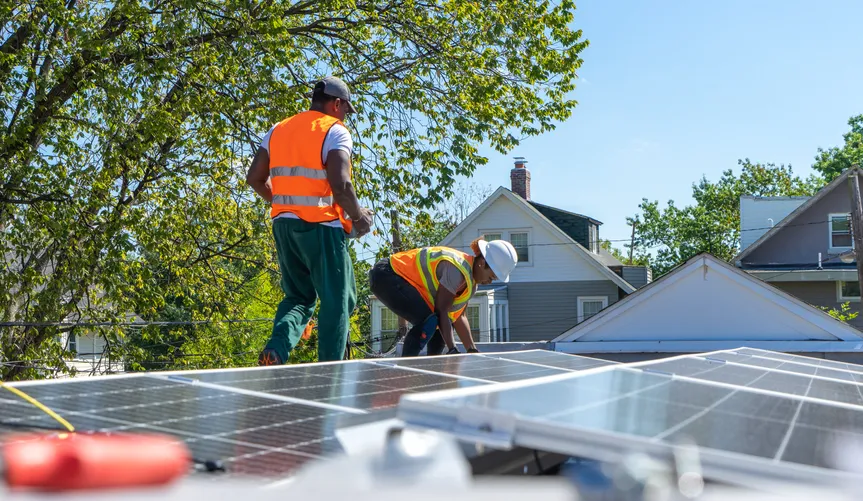
The Trump administration has officially announced it is killing the $7 billion Solar for All program. The program had awarded grants to 60 state agencies, municipalities, tribal governments, and nonprofits across the country to help low-income households access solar power. Supporters of Solar for All are vowing to fight the move in court.
On Thursday, Environmental Protection Agency Administrator Lee Zeldin posted a video on the X social media platform stating that he was terminating the program. Solar for All was created as part of the Inflation Reduction Act’s $27 billion Greenhouse Gas Reduction Fund (GGRF), which has also been under attack by the Trump administration.
Zeldin stated that the mega-law passed by Republicans in Congress last month “eliminates billions of green slush-fund dollars by repealing the Greenhouse Gas Reduction Fund.”
Referring specifically to Solar for All, Zeldin said, “EPA no longer has the authority to administer the program, or the appropriated funds to keep this boondoggle alive. With clear language and intent from Congress in the One Big Beautiful Bill, EPA is taking action to end this program for good.”
Defenders of Solar for All challenge Zeldin’s interpretation of the One Big Beautiful Bill, or HR 1, and the intent of its provisions.
“It is absolutely ludicrous to suggest that HR 1 rescinded these funds, because they were all under legally obligated grant awards when the bill was signed,” said Jillian Blanchard, vice president of climate change and environmental justice at Lawyers for Good Government, a nonprofit coalition of attorneys, law students, and activists that’s challenging other EPA funding cuts. “HR 1 only rescinded unobligated grant funds,” she told Canary Media on Thursday.
That’s an important distinction, she said. Those unobligated grant funds amounted to only $19 million, as determined by the Congressional Budget Office (CBO) when it conducted its analysis of the pending legislation’s overall financial impact. The vast majority of the funds, the office found, were already committed under legally binding contracts to the parties awarded grants during the Biden administration.
But in a court case challenging the EPA’s effort to claw back $20 billion in funds for other GGRF programs, administration officials have claimed that HR 1 terminates the government’s obligation to meet any of its contractual obligations.
Attorneys for nonprofit groups fighting EPA’s attempt to claw back their grants argued that the law clearly states that only “unobligated balances of amounts made available to carry out that section … are rescinded.”
The attorneys also noted that Sen. Shelley Moore Capito, the West Virginia Republican and chair of the Senate Committee on Environment and Public Works, stated during a congressional debate before the bill passed that funding “that’s already been obligated and out the door, that’s a decision that’s final,” and that arguing the law would claw back obligated funding is “a ridiculous thought.”
Sen. Sheldon Whitehouse (D-R.I.) pointed out this same discrepancy in a July press release attacking EPA’s characterization of the law. “Trump’s DOJ is continuing its mischief by falsely claiming Republicans’ Big Beautiful-for-Billionaires Bill claws back $17 billion from GGRF, even though the CBO score for the unobligated funds was $19 million — what was left to oversee the program after the grant funds had been obligated — and Republicans made clear that their rescissions only touched unobligated funding,” Whitehouse wrote.
The Solar for All program is meant to deliver energy-bill savings of $350 million over the next five years to 900,000 low-income and disadvantaged households and deploy 4 gigawatts of solar generation capacity. In the past few months, a handful of grantees had begun issuing awards to low-income housing projects, municipal facilities, nonprofits, and low-income homeowners.
“Communities promised relief from punishing energy costs are now left in the dark,” Zealan Hoover, a former EPA senior advisor under the Biden administration, told Canary Media. “Nearly a million families will pay hundreds of dollars more each year for their electricity bill because the Trump administration killed a program that would have more than paid for itself.”
Michelle Moore, CEO of Groundswell, a Washington D.C.-based nonprofit that is administering a $156 million Solar for All grant aimed at developing large-scale solar and battery projects in Southeastern states, said that ending the program would run counter to President Donald Trump’s pledge to lower energy prices.
“I would hope [the Office of Management and Budget] could find the funding to cover EPA staff time to help keep President Trump’s campaign promise to cut bills in half and keep energy affordable for American families, which this program does,” she told Canary Media.